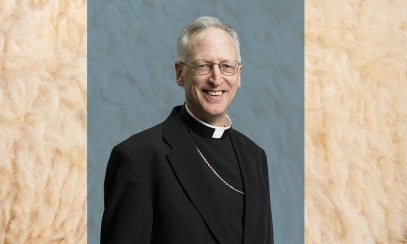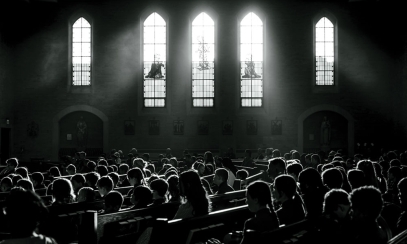What are indulgences?
In the last issue of FAITH, you received some information about indulgences. This was in response to the Holy Father’s offer during this Year of Faith as we make a pilgrimage to one of the churches in our diocese. Let us look a bit at the foundations of the teaching about indulgences.
The first principle is the communion of saints based on St. Paul’s teachings about the body of Christ. (cf. Romans 12:5) We believe that the faithful on earth, the saints in heaven, and the dead in purgatory are all united in the body of Christ, so that our sins on earth hurt the communion of the body and the holiness of the saints in heaven helps the communion of the body.
A second principle is that we can actually suffer for one another’s benefit – “in my flesh I complete what is lacking in Christ’s afflictions for the sake of his body, that is, the Church.” (9 Col 1:24) Thus our every good action not only benefits ourselves by making satisfaction for the damage our sins have done but, if we wish, they can benefit others. We, in imitation of Christ, are able to offer ourselves and our sufferings for others.
A third principle is that sin has two consequences. It destroys (mortal sin) or weakens (venial sin) our communion with God and the Church and it deserves punishment, either eternal (mortal sin) or temporal (venial sin). This is a matter of justice. Confession and absolution heal the communion with God and the Church and thus remove our guilt. In addition, it removes our eternal punishment as well and, if it is a truly sincere conversion, our temporal punishment.
Most of us, however, do not undergo such a sincere conversion. Thus, there are the daily acts of charity, prayer, and penance to change our lives and make up for the damage we have done to the communion of the body of Christ which slowly purifies us of that temporal punishment. This process will be completed in purgatory, if not here on earth. This is also where we can help one another by our sacrifices.
A fourth principle is that there is a superabundance of grace available to pay for all the sins of the world. Christ’s own satisfaction for us and our sins is inexhaustible (cf. I Jn 2:2). This infinite treasure has been given to the Church.
A fifth principle is based on changes in the sacrament of reconciliation. In the early Church, the very long (often years or even a lifetime) penance had to be completed before being fully reconciled to the Church. As time passed, psalms, almsgiving, pilgrimages and other actions served to replace these years of penance. In addition, absolution was then given before completing the penance, which is the norm today.
A sixth principle is that the Church has the authority to dispense the infinite treasure of grace to Christians in order to help them convert and heal the damage their sins have done to the communion of the body. The Church received this authority in the power to forgive sins (Jn 20:22-23) and the power of the keys. (Mt 16:19) Thus the Church can establish means for the remission of punishment due to sins already confessed, either fully (plenary indulgence) or partially (partial indulgence), upon the completion of certain acts of penance, prayer or charity.
Pope Sixtus IV (1476) also stated that we could gain such remission for the dead, which meant that the Church would beg God’s mercy to help free sinners in purgatory from their temporal punishment.
Many errors have been committed in the area of indulgences, all condemned by the Church, such as buying indulgences, forgiveness for current or future sins (in fact, indulgences do not forgive any sins, but only remove punishment due sins), people gaining indulgences for others for a fee, false indulgences, promises of getting into heaven for the living or the dead. Unfortunately, many of these abuses contributed to the Protestant Reformation.
Paul VI clarified Catholic teaching by eliminating the “days” and “years” formerly associated with indulgences, and instead focused on the availability of the treasury of grace to all who earnestly seek conversion of heart through the ministry of the Church. Every indulgence requires that the baptized be forgiven in the Sacrament of Reconciliation. They are a reminder to us that we are never alone in our journey of conversion to God, but that the entire Church assists us out of the abundance of Christ’s own sufferings, which the Church generously mediates.
Bishop Earl Boyea is the fifth bishop of the Catholic Diocese of Lansing.


